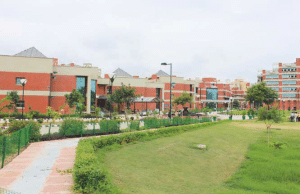
Smt Naseem Akhtar Insaaf,
Minister of State for Education, Government of Rajasthan
In this year’s budget, there will be no exaggeration if I say that this time there was a huge amount allocated for educational development in Rajasthan.There are various schemes, such as giving scooters to students of Other Backward Castes (OBC) as reward for thosegetting more than 55 percent marks or taking admission in college. Government is also giving laptops to girls belonging to minority
communities who are scoring good marks in schools and are opting for higher studies. Children, especially girls, who earlier used to walk kilometers to reach schools, are now being given bicycles for easy conveyance to schools. This boosts the moral of children to get education.
Government has opened thousands of new primary schools, and thousands of primary schools have graduated to secondary schools. Educational developments are on going from the past many years.
Government is putting so much of efforts because we want to create awareness about education in every sector of the society. Our aim is to educate every single person in every village of Rajasthan. In urban areas education is still at par, but rural areas need real attention.We are targeting to control the dropout rates in schools. We are running bridge courses to associate them to schools. Government will give laptops to the top 10 meritorious students of Xth and XIIth boards. Government is also distributing special learning laptops to the VIIIth class students. This is a huge investment, but government wants competitiveness among students and we want to connect our education system with information technology.
Indira Priyadarshani Puruskar,Gargi Puruskar, free K-12 education for girls are some phenomenal initiatives taken by the government.
Government’s initiatives
It is the 21st century, and it is an advanced era of information technology. We need an education system of global level. Indian students are very much popular all around the world in terms of quality education. Even the US President, Barack Obama, watches out for Indian talent.
The central government has helped us in providing broadband services at all the levels. Now Rajiv Gandhi Bharat Nirman Seva Kendra is also connected through IT. These initiatives eased the life of rural population in Rajasthan as they are now able to do most of their work like bill payment and getting many other documents from village itself through IT.
Rajasthan has set such a model in terms of IT advancement that when the US President, Barack Obama came to Indiahe spoke to the people of Kanpura – a small panchayat of Ajmer, direct from New Delhi through video conferencing.Numbers of schools have got computer labs, and even many classrooms are connected with IT.
Importance of girl education
The Government has provided a lot for education. Now it is our responsibility to take it to the common man. Our government is determined to educate each and every female in the state. That is why we are highly focused towards girls’ education. When a girl gets educated, she educates two families – one is the family she is born in, and the other is the family she gets married in. She inculcates morals and ethics in the family. The first teacher of any human being is his/her mother.
We need to add morals and traditions values to our education system. We will be able to build a constructive and cultural society only when we tech morals in our education system.
Various malpractices happening in society like female foetus killing, and rapes can be curbed up to greater extent if we educate a child systematically since he is in his mother’s lap and then in primary education. We should inculcate values in our child so that in future he becomes a man with a healthy mentality.







 There was a time when MBA provoked a lot of craze among people. However, over the last few years, not only in India but even in the US, placements have been very bad in MBA institutes. The cost of tuition has risen manifold. The two-year MBA has lost its relevance, and it should be converted into a combined four-year programme. In fact, specialisation programmes of 14- 18 months on business analytics, financial engineering, multimedia, e-commerce, and digital marketing will do well in future.
There was a time when MBA provoked a lot of craze among people. However, over the last few years, not only in India but even in the US, placements have been very bad in MBA institutes. The cost of tuition has risen manifold. The two-year MBA has lost its relevance, and it should be converted into a combined four-year programme. In fact, specialisation programmes of 14- 18 months on business analytics, financial engineering, multimedia, e-commerce, and digital marketing will do well in future.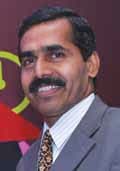 Over the years, foreign presence may increase in the management institutes and programme offerings will be changed. Less than two years or executive MBA programmes will gain popularity.
Over the years, foreign presence may increase in the management institutes and programme offerings will be changed. Less than two years or executive MBA programmes will gain popularity. Only three percent of India’s total R&D is conducted by educational institutions, and we have not done well in applied research in engineering and management as well. So, that is a matter of concern. Also, teaching is usually done through the case study method that focuses on companies who have performed in terms of profit and strategy. But this method has become obsolete abroad, as it talks about past practices. But today, the future lies in building socially responsible companies and innovative practices.
Only three percent of India’s total R&D is conducted by educational institutions, and we have not done well in applied research in engineering and management as well. So, that is a matter of concern. Also, teaching is usually done through the case study method that focuses on companies who have performed in terms of profit and strategy. But this method has become obsolete abroad, as it talks about past practices. But today, the future lies in building socially responsible companies and innovative practices.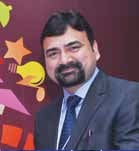 There has been a dearth of serious people in education. I feel the faculty and students are the heart of any institute. We should invest in delivering quality knowledge and more value for all stakeholders. For instance, we have a structured mentorship programme for students at our institute, where faculty and industry leaders come together to guide our students. We also have academy quality assurance system, and academic audit at both internal and external level.
There has been a dearth of serious people in education. I feel the faculty and students are the heart of any institute. We should invest in delivering quality knowledge and more value for all stakeholders. For instance, we have a structured mentorship programme for students at our institute, where faculty and industry leaders come together to guide our students. We also have academy quality assurance system, and academic audit at both internal and external level.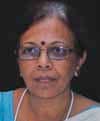 There is a common concern among universities of management education world-over on how to build socially sensitive business leaders for tomorrow. Our institute undertakes many pedagogic innovations in this regard. For example, the programme called ‘Abyudaya’, where our students mentor underprivileged students from neighbouring slums.
There is a common concern among universities of management education world-over on how to build socially sensitive business leaders for tomorrow. Our institute undertakes many pedagogic innovations in this regard. For example, the programme called ‘Abyudaya’, where our students mentor underprivileged students from neighbouring slums.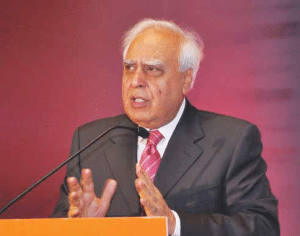 Kapil Sibal,
Kapil Sibal,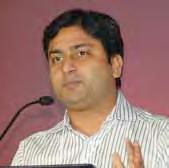 content. Context is more important than content. We conducted an experiment, where we converted a sixth-grade science textbook into a comic. Students read through their entire science textbooks in exactly two days. So by changing context you can get students’ interest.
content. Context is more important than content. We conducted an experiment, where we converted a sixth-grade science textbook into a comic. Students read through their entire science textbooks in exactly two days. So by changing context you can get students’ interest.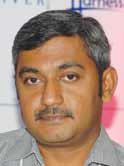 There is only one percent penetration of interactive displays in India, while other countries like Moscow, Russia, and China have far greater adoption. So as a technology provider, we are working with our ecosystem to ensure that some of these problems are captured in our future products. Also, the future lies in 3-D stereoscopic, which is more engaging for students.
There is only one percent penetration of interactive displays in India, while other countries like Moscow, Russia, and China have far greater adoption. So as a technology provider, we are working with our ecosystem to ensure that some of these problems are captured in our future products. Also, the future lies in 3-D stereoscopic, which is more engaging for students.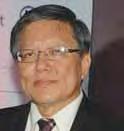 Our project e-Pronounce is an ongoing research project. It aims at learning correct pronounciation using phonetic symbols. We wanted to have something to bridge the language divide for people in the non-native English environment. The objective is pedagogy first and technology second.
Our project e-Pronounce is an ongoing research project. It aims at learning correct pronounciation using phonetic symbols. We wanted to have something to bridge the language divide for people in the non-native English environment. The objective is pedagogy first and technology second. apply technology. It’s about completely re-thinking the way we personalise learning spaces and learning experiences. It means we place the students at the core, and let them set their goals. Instead of teachers, we should have coaches. This personal coaching leads to personal accountability for the students. Even the assessments have to be on the basis of knowledge instead of running after grades or marks.
apply technology. It’s about completely re-thinking the way we personalise learning spaces and learning experiences. It means we place the students at the core, and let them set their goals. Instead of teachers, we should have coaches. This personal coaching leads to personal accountability for the students. Even the assessments have to be on the basis of knowledge instead of running after grades or marks.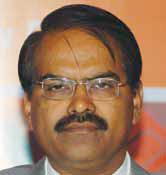 Education should not be limited to reading or writing, it must be understood,
Education should not be limited to reading or writing, it must be understood,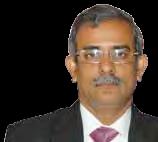 Our core function is to digitise data that is written by hand to business processable data. We designed a digital pen with the prime purpose of not wasting human time for completely nonproductive things. I believe any new technology faces problems of adaptation and adaptability. No technology is bad. It only fails when it is wrongly implemented.
Our core function is to digitise data that is written by hand to business processable data. We designed a digital pen with the prime purpose of not wasting human time for completely nonproductive things. I believe any new technology faces problems of adaptation and adaptability. No technology is bad. It only fails when it is wrongly implemented.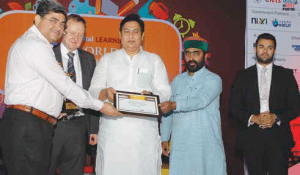 Carrying forward the grand success of its earlier editions, the 3rd annual edition of World Education Summit was held on April 23-24, 2013,in New Delhi. World Education Summit 2013 was jointly organised by the AICTE, and Elets Technomedia Pvt Ltd; and was co-organised by the UNESCO,NCERT, and National Institute of Open Schooling (NIOS).
Carrying forward the grand success of its earlier editions, the 3rd annual edition of World Education Summit was held on April 23-24, 2013,in New Delhi. World Education Summit 2013 was jointly organised by the AICTE, and Elets Technomedia Pvt Ltd; and was co-organised by the UNESCO,NCERT, and National Institute of Open Schooling (NIOS). The students of Bal Bharati Public School in collaboration with Genoveva Gymnasium, Germany, have done exemplary work on the global issue – Migration. This made them win the World Education Award 2013 under ‘Global Collaborative Learning Initiative’ category
The students of Bal Bharati Public School in collaboration with Genoveva Gymnasium, Germany, have done exemplary work on the global issue – Migration. This made them win the World Education Award 2013 under ‘Global Collaborative Learning Initiative’ category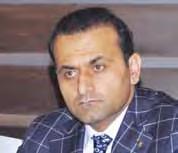 We are grateful to India for leading the international education aid programmes in our country. Nearly 7,000 Afghan students are studying at universities and technical schools across India. We look forward to increased collaboration between India and Afghanistan through faculty and student exchange programmes. Educational co-operation through sustainable mechanisms will go a long way in enabling an economically and socially integrated region.
We are grateful to India for leading the international education aid programmes in our country. Nearly 7,000 Afghan students are studying at universities and technical schools across India. We look forward to increased collaboration between India and Afghanistan through faculty and student exchange programmes. Educational co-operation through sustainable mechanisms will go a long way in enabling an economically and socially integrated region.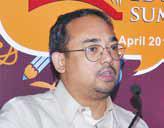 There are many avenues of collaboration between India and the Philippines including the education sector. We welcome Indian investment in education in the Philippines. There is already an increased people-to-people contact between the two nations. Implementing less restrictive visa policies is a building block that can go a long way in boosting ties in the field of education. I also believe organisations like ASEAN and SAARC should look into co-operation in education with India.
There are many avenues of collaboration between India and the Philippines including the education sector. We welcome Indian investment in education in the Philippines. There is already an increased people-to-people contact between the two nations. Implementing less restrictive visa policies is a building block that can go a long way in boosting ties in the field of education. I also believe organisations like ASEAN and SAARC should look into co-operation in education with India. more international students, especially in the short -term programmes of six months or nine months. Slovenia and India have been the main supporters of the International Centre for Promotion of Enterprises (ICPE) for the last two decades and we have had a lots of students from India. The programme will begin from this year in October and we expect that at least 25 or more students will enrol.
more international students, especially in the short -term programmes of six months or nine months. Slovenia and India have been the main supporters of the International Centre for Promotion of Enterprises (ICPE) for the last two decades and we have had a lots of students from India. The programme will begin from this year in October and we expect that at least 25 or more students will enrol.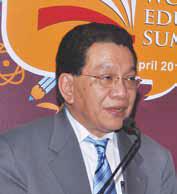 Our gross enrolment ratio (GER) in higher education is 28 percent and our government is setting up a new target of 30 percent, for 2014. Thus, there is a need for more higher education institutions in Indonsesia, and we look forward to more collaboration with friendly countries like India. Also, India has now become an attractive education destination for students from overseas students. We are already working closely in several areas like organising training and exchange programmes and joint-research programmes.
Our gross enrolment ratio (GER) in higher education is 28 percent and our government is setting up a new target of 30 percent, for 2014. Thus, there is a need for more higher education institutions in Indonsesia, and we look forward to more collaboration with friendly countries like India. Also, India has now become an attractive education destination for students from overseas students. We are already working closely in several areas like organising training and exchange programmes and joint-research programmes.

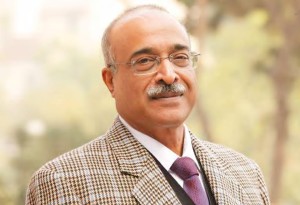
 Quality is the hallmark of education. It can be attained by aligning global partnerships to national interest, along with institutional autonomy, balanced with accountability to prevent misuse of freedom. The private institutions should come up with innovations to include a global perspective in a more global-oriented curriculum. The students should be given challenging assignments and be evaluated on an innovative grading system.
Quality is the hallmark of education. It can be attained by aligning global partnerships to national interest, along with institutional autonomy, balanced with accountability to prevent misuse of freedom. The private institutions should come up with innovations to include a global perspective in a more global-oriented curriculum. The students should be given challenging assignments and be evaluated on an innovative grading system. For education we need only one thing, which is a great mind and enabling environment. We know that India has great minds, but where is the enabling environment? There is a lack of freedom for private institutions. The hope is that they can differentiate themselves by focusing on students, who should be treated as the centre of all the activities. Another hope is in engaging the industry, as employability of students depends on the industry. But it has to be two-sided interaction wherein teachers and students also contribute to the industry. Also, private universities should have other models of revenue generation apart from students’ fees, to remain s u s t a i n – able in the long-run.
For education we need only one thing, which is a great mind and enabling environment. We know that India has great minds, but where is the enabling environment? There is a lack of freedom for private institutions. The hope is that they can differentiate themselves by focusing on students, who should be treated as the centre of all the activities. Another hope is in engaging the industry, as employability of students depends on the industry. But it has to be two-sided interaction wherein teachers and students also contribute to the industry. Also, private universities should have other models of revenue generation apart from students’ fees, to remain s u s t a i n – able in the long-run. We believe in innovations through entrepreneurship whether it is technology or management or business schools. The motive should now be to produce employers rather than employees, because an employer can feed and assist four other people. We encourage our students to take up entrepreneurial projects.
We believe in innovations through entrepreneurship whether it is technology or management or business schools. The motive should now be to produce employers rather than employees, because an employer can feed and assist four other people. We encourage our students to take up entrepreneurial projects. Innovative curriculum, including contemporary subjects, is going to be the most important thing in the coming years. Experiential learning is also very important and students need to take up projects with the industry. Technology transfer and collaborations between government, research institutions, and industry are going to play a pivotal role.
Innovative curriculum, including contemporary subjects, is going to be the most important thing in the coming years. Experiential learning is also very important and students need to take up projects with the industry. Technology transfer and collaborations between government, research institutions, and industry are going to play a pivotal role. Though the private sector has contributed a lot towards the success of technical education, priority structures have to be maintained across institutions. The most important thing on the list is the quality of the faculty that you acquire. It has to be followed by teaching-learning processes, quality of academic leadership, quality of admission, alumni relations, sports and cultural activities. But most of these segments have been misplaced in the priority list. It is time to stop distinguishing between public and private colleges, rather making both of them deliverable.
Though the private sector has contributed a lot towards the success of technical education, priority structures have to be maintained across institutions. The most important thing on the list is the quality of the faculty that you acquire. It has to be followed by teaching-learning processes, quality of academic leadership, quality of admission, alumni relations, sports and cultural activities. But most of these segments have been misplaced in the priority list. It is time to stop distinguishing between public and private colleges, rather making both of them deliverable.
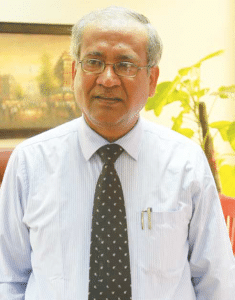 Prof (Dr) Dilip K Bandhyopadhyay,
Prof (Dr) Dilip K Bandhyopadhyay,